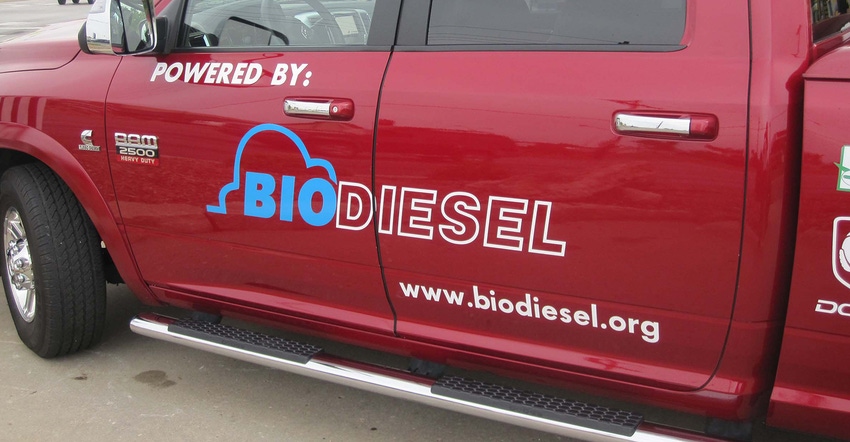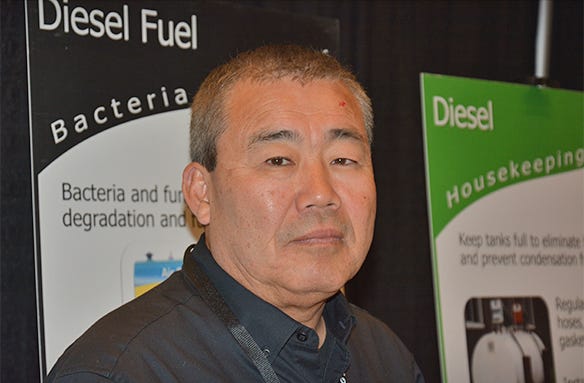
With Minnesota’s B20 mandate effective May 1, diesel retailers, fuel distributors and farmers are learning how to transition to the new fuel requirements, and how to treat and prevent common diesel issues.
Nine workshops are being held through the month of March across the state, sponsored by the Minnesota Soybean Research and Promotion Council.
Speakers at the kickoff meeting Feb. 12 in St. Paul were Bob Patton, supervisor of the energy and environment section, Minnesota Department of Agriculture; Julie Quinn, director of the weight and measures division, Department of Commerce; and Hoon Ge, president of MEG Corp Fuel Consulting.
Patton gave an overview of the biodiesel law in Minnesota — the first state in the U.S. in 2002 to mandate the use of biodiesel — and how the fuel has transitioned from B5 to B10, and soon will move to B20. In order to meet the B20 minimum requirement, Patton explained that four conditions first had to be in place: federal testing standards, sufficient supply to provide 50% or more biodiesel, adequate statewide blending infrastructure, and 5% of biodiesel supplies from alternative feedstuffs.
Those conditions have been met, Patton said, requiring No. 2 diesel fuel to contain a minimum of 20% biodiesel until Sept. 30. The biodiesel blend will change to B5 from Oct. 1 to March 31, and then return to B20 April 1, 2019.
Quinn explained that the commerce department’s motto is “Equity in the marketplace,” and that the department works to enforce the mandate equally with everyone.
She encouraged diesel retailers and fuel distributors to line up higher-blend supplies sooner than later, and to be prepared for turning over fuel tanks twice — to meet the May 1 deadline for B20, and again in the fall, when biodiesel rolls back to B5. In anticipation of the May 1 deadline, retailers could blend up by either gradually increasing the level of B20 in their tanks, or doing it all at once.
“We recommend using a higher blend and a smaller delivery to turn [your supply] over in a couple of deliveries,” Quinn said. To go from B5 to B10 and then B10 to B20, she noted that retailers would need access to higher blends, such as B30 and B40.
“Remember, it is important to blend and recirculate fuel [in storage], so there are not layers of biodiesel in tanks,” she added.

PREVENT, TEST: For optimal fuel performance, biodiesel users are encouraged to follow best management practices, and to have their products tested if they have concerns. Hoon Ge of MEG Corp, Plymouth, Minn., offered suggestions for attendees at a recent “Be Ready for B20” meeting in St. Paul, Minn., and at Ag Expo in Mankato, Minn., in January.

Quinn also cautioned station owners to check their bills of lading each time they take a delivery.
“You should be getting what you paid for,” she said. “Train your staff to do that, too. You have your reputation on the line.”
If discrepancies are noted on the bill, she encouraged owners to call her department at 651-539-1556.
Ge, a chemical engineer with 25 years in the petroleum industry, shared troubleshooting tips for biodiesel issues, noting that water is the No. 1 reason for clogged filters. Air is the second menace.
“Water enters the tank mostly as condensation from air,” he said. “So keep your tank as full as possible.” Free water in the fuel system accelerates corrosion and fuel degradation.
“Biodiesel holds more water than ultra-low-sulfur diesel,” he added.
Ge said that 90% of diesel gelling problems are caused by icing.
“Icing occurs at temperatures below 32 degrees F. At -10 degrees to -20 degrees, all the water falls out of the fuel,” he said. “Ice crystals will block the fuel from flowing through the filter.” He suggested putting in de-icer toward the end of October.
He pointed out, too, that biodiesel should be bright and clear. Pull a sample from the bottom of the tank into a clear container. Hold something behind it, such as a ruler. You should be able to read it.
“Hazy fuel indicates there is water saturation,” Ge noted.
Quinn interjected at this point: “We will shut you down for this, if you have hazy fuel and you can’t see through it.”
Other tips offered by Ge to ensure high-quality biodiesel and equipment operation include:
• Monitor hoses. Fill and check vapor caps and gaskets for leaks.
• Install a 30-micron filter on the dispenser to accommodate the higher viscosity of the fuel in winter. If the filter is black and has no odor, that indicates oxidation. If there is a smell, that indicates microbial contamination.
• Consider buying biodiesel from one supplier. “If you had a problem and had more than one supplier, they would end up pointing fingers at each other,” Ge said. Also, do not buy a tank of product from just anyone. “It might be cheap, but what are you getting?” he asked.
• When using additives, make sure the fuel is at least 10 degrees F above its cloud point. “In order for the additive to work, the fuel has to be a certain temperature or you’ve wasted your money,” Ge said.
• In the fall, before cold weather hits, check your tanks for water condensation. Check them again in the spring. Remove any free water.
• Buy diesel that meets the American Society for Testing and Materials standard D6751.
Quinn said the state lab offers testing and can give a pass-or-fail report. If a biodiesel sample required further diagnostics, she recommended Ge’s fuel testing lab.
Ge said biodiesel samples could be dropped off at his fuel testing lab west of Minneapolis, near the I-494/Highway 55 intersection in Plymouth, Minn. Ge, who also had a booth at Ag Expo in January, said his lab also would test filters, too, and do so for free for farmers. Pull out the filter and drain it, and seal it in a zip-close bag and ship it priority mail, he said. The lab strives to turn around results within 48 hours.
More B20 workshops
Additional Be Ready for B20 workshops will be held at the following locations:
• March 5, Mankato, Minn.; Courtyard by Marriott Event Center, 901 Raintree Road; 11:30 a.m. to 2 p.m., lunch included
• March 6, Worthington, Minn.; Worthington Event Center, 1447 Prairie Drive; 8:30 to 11 a.m., breakfast included
• March 6, Marshall, Minn.; AmericInn Lodge & Suites, 1406 E. Lyon St.; 2:30 to 4:30 p.m.
• March 7, Willmar, Minn.; American Legion, 220 19th Ave SW; 11:30 a.m. to 2 p.m., lunch included
• March 13, Alexandria, Minn.; Holiday Inn, 5637 Highway 29 South; 11:30 a.m. to 2 p.m., lunch included
• March 14, Moorhead, Minn.; Courtyard by Marriott, 1080 28th Avenue South; 8:30 to 11 a.m., breakfast included
• March 20, Winona, Minn.; The Plaza Hotel & Suites, 1025 Highway 61 East; 11:30 a.m. to 2 p.m., lunch included
• March 21, Rochester, Minn.; Hampton Inn & Suites, 2870 59th St. NW; 8:30 to 11 a.m., breakfast included
• March 21, Albert Lea, Minn.; Leo Carey American Legion Post 65, 142 N. Broadway Ave.; 2:30 to 4:30 p.m.
• March 22, St. Cloud, Minn.; Courtyard by Marriott, 404 W. St. Germain St.; 11:30 a.m. to 2 p.m., lunch included
Interested in attending? RSVP at 952-473-0044, or email [email protected].
Learn more
For more information on MEG’s fuel testing, visit megcorpmn.com.
Get more information on Minnesota's biodiesel mandate.
About the Author(s)
You May Also Like






